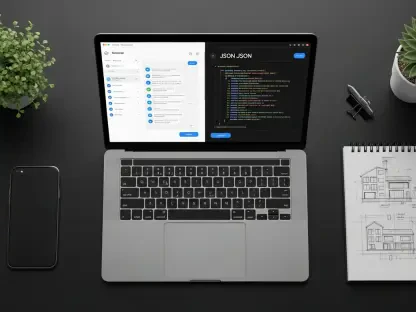In a transformative moment for the media production industry, two pioneering companies have come together to address the pressing challenges of collaborative workflows with a cutting-edge on-premises solution that promises to revolutionize the field. Facilis Technology, a long-standing expert in high-performance shared storage systems, has partnered with Strada, an emerging startup focused on peer-to-peer file streaming technology. This collaboration, highlighted in a recent press release, integrates Strada’s innovative Agent software into Facilis HUB servers, offering creative teams a secure and direct way to access project assets. Unlike traditional cloud-based storage, this approach tackles critical issues such as escalating costs, security risks, and latency, providing a compelling alternative for professionals across various sectors.
This alliance is more than a technological advancement; it represents a shift in how media professionals can manage and share content in an increasingly distributed work environment. From broadcast news to animation and visual effects studios, the need for seamless, reliable, and affordable tools has grown exponentially. Facilis and Strada are poised to meet these demands by combining robust hardware with intuitive software, ensuring that teams can collaborate effectively whether they are in the same building or spread across the globe. The emphasis on maintaining control over sensitive data through on-premises infrastructure resonates with industry concerns about data breaches and dependency on third-party providers.
The Power of Partnership: Blending Expertise for Progress
Revolutionizing Media Workflows
Facilis Technology, a Massachusetts-based company with over two decades of experience, has built a reputation for delivering high-performance shared storage systems tailored for collaborative media production. Catering to diverse industries such as advertising, higher education, and government agencies, their HUB servers are celebrated for adaptability and seamless network integration. Meanwhile, Strada, a Los Angeles startup founded by industry innovators, has rapidly gained traction since its launch with over 5,000 users globally. Specializing in peer-to-peer streaming, Strada brings a fresh perspective to file access for video content creators. Together, these companies are crafting a solution that prioritizes direct, efficient access to assets, steering clear of the complexities and costs associated with cloud dependency, and setting a new benchmark for media workflows.
This partnership goes beyond combining technologies; it’s about addressing the evolving needs of a global creative workforce. Facilis’ established infrastructure provides a solid foundation for high-quality media handling, while Strada’s innovative approach to remote access enhances flexibility for distributed teams. The synergy between the two aims to streamline processes for industries that rely on large file transfers and real-time collaboration. By focusing on on-premises solutions, the collaboration offers an alternative that empowers users to maintain control over their data, a critical factor in an era where security breaches are a constant threat. This joint effort is a testament to how strategic alliances can drive meaningful progress in the media production landscape.
Building on Complementary Strengths
The collaboration leverages the unique strengths of both companies to create a cohesive and powerful toolset for media professionals. Facilis brings to the table its expertise in designing customizable, software-defined workflows that integrate effortlessly into existing network environments. Their systems are known for supporting remote access and asset management, making them a trusted choice for high-stakes projects. Strada, on the other hand, introduces a patent-pending technology that transforms on-premises storage into a globally accessible network, saving time and reducing operational costs. This blend of reliability and innovation ensures that users can adopt cutting-edge tools without abandoning their current infrastructure, a key consideration for budget-conscious organizations.
Moreover, the shared vision of Facilis and Strada centers on empowering creative teams with solutions that are both practical and forward-thinking. The focus on enhancing collaboration through secure, direct access to shared assets addresses a critical pain point for distributed teams working on tight deadlines. By combining Facilis’ robust hardware with Strada’s intuitive software, the partnership delivers a user experience that balances performance with accessibility. This approach not only caters to large broadcast networks but also supports smaller studios looking for scalable, cost-effective options. The result is a solution that feels tailored to the diverse needs of the media industry, promising to reshape how content is created and shared.
Key Innovations Driving Change
Seamless Integration and Direct Access
At the heart of this collaboration is the integration of Strada’s Agent software into Facilis HUB servers, a move that positions Facilis as the only on-premises shared media storage platform supporting this unique peer-to-peer streaming technology. Specifically designed for HUB servers with optional GPU upgrades, this software can be activated through a subscription model, making it accessible to both new and existing customers. The technology enables authenticated users to access shared media files directly over the internet via an encrypted connection, eliminating the need for third-party cloud providers. This direct access significantly reduces latency, ensuring that teams can work with large files in real time without delays, a crucial advantage for time-sensitive projects.
Security remains a top priority in this innovative setup, with robust protocols in place to ensure that only authorized individuals can interact with sensitive content. By bypassing external cloud services, the solution minimizes exposure to potential data vulnerabilities often associated with third-party storage. This focus on encrypted, direct connections offers peace of mind to media professionals handling confidential material. Additionally, the integration is designed to be straightforward, allowing users to adopt the technology without extensive retraining or system overhauls. This seamless blend of Strada’s streaming capabilities with Facilis’ high-performance storage creates a powerful tool that redefines efficiency in media collaboration.
Supporting Hybrid Teams
One of the standout features of this partnership is its ability to cater to the needs of distributed content creation teams through a hybrid workflow model. The solution provides fast, reliable access to large media files, ensuring that team members can collaborate effectively whether they are on-site or working remotely. Strada’s web-browser interface, compatible with both iOS and Android platforms, enhances this flexibility by allowing users to navigate folders, play media, and transfer files from virtually any device. This mobile-friendly design is particularly beneficial for professionals on the go, as well as clients who need quick access to project updates without requiring specialized software.
Beyond accessibility, the emphasis on supporting hybrid teams reflects a broader shift in the media industry toward flexible work arrangements. The intuitive interface simplifies complex tasks, making it easier for even non-technical team members to participate in collaborative efforts. This inclusivity fosters smoother communication between creatives, editors, and stakeholders, regardless of their location. Furthermore, the ability to handle large file transfers efficiently addresses a common bottleneck in remote workflows, ensuring that deadlines are met without compromising on quality. As hybrid models become the norm, this solution stands out as a timely and practical response to the evolving demands of content production.
Industry Impact and Future Outlook
Addressing Cost and Security Concerns
A significant advantage of the Facilis-Strada collaboration lies in its commitment to affordability, a point underscored by industry leaders from both companies. Compared to recurring cloud storage subscriptions, this on-premises solution offers substantial cost savings, making advanced collaborative tools accessible at a competitive entry price. This affordability is especially appealing to smaller facilities and independent creators who often struggle with the high expenses of cloud-based systems. By providing a viable alternative, the partnership ensures that cutting-edge technology is within reach for a broader range of users, potentially leveling the playing field in the media production sector.
Security is another critical area where this solution excels, addressing widespread concerns about data breaches and unauthorized access. The use of encrypted connections and strict user authentication protocols safeguards sensitive content, offering a level of protection that many cloud services struggle to match. This focus on data integrity is vital in an industry where intellectual property and client confidentiality are paramount. By prioritizing both cost-effectiveness and robust security measures, the collaboration not only meets immediate needs but also builds trust among users wary of vulnerabilities in traditional storage options. This dual emphasis positions the solution as a forward-thinking choice for media professionals.
Aligning with Industry Trends
The partnership between Facilis and Strada mirrors a growing industry trend toward reducing reliance on cloud-based storage due to persistent issues with cost, security, and performance. Media production professionals increasingly favor on-premises solutions paired with advanced remote access technologies, seeking greater control over their assets. This collaboration aligns perfectly with that shift, offering a hybrid workflow model that supports both local and remote team members. It responds to the demand for tools that balance efficiency with data sovereignty, a pressing concern in today’s globalized creative landscape where data privacy regulations are tightening.
Additionally, the focus on integrating with existing infrastructure highlights an understanding of the practical challenges faced by media organizations. Many companies are hesitant to overhaul their systems due to cost and downtime risks, and this solution mitigates those concerns by enhancing rather than replacing current setups. As the industry continues to evolve, the push for hybrid and on-premises alternatives is likely to intensify, positioning this collaboration as a timely intervention. The planned demonstration at the IBC Convention in Amsterdam from September 12th to 15th further signals its relevance, offering a platform to showcase how it meets emerging needs on an international stage.
Empowering Creative Teams
Looking back, the alliance between Facilis Technology and Strada marked a pivotal moment in redefining media workflow solutions through their innovative integration. By embedding Strada’s peer-to-peer streaming software into Facilis HUB servers, the partnership delivered a secure, efficient alternative to cloud storage that resonated with diverse creative teams. The emphasis on direct access and user-friendly design ensured that professionals of all technical levels could collaborate seamlessly, enhancing productivity across industries. This solution proved to be a game-changer by addressing real-world challenges with practical, scalable tools.
Reflecting on the impact, the collaboration also set a precedent for prioritizing cost savings and robust security, areas that had long troubled media professionals. As a next step, organizations were encouraged to explore how such on-premises solutions could integrate into their workflows, potentially reducing overhead while maintaining high standards of data protection. The successful showcase at the IBC Convention demonstrated the global appetite for such innovations, suggesting that future advancements should continue to focus on accessibility and adaptability. This partnership paved the way for ongoing discussions about balancing technology with user needs in content creation.









